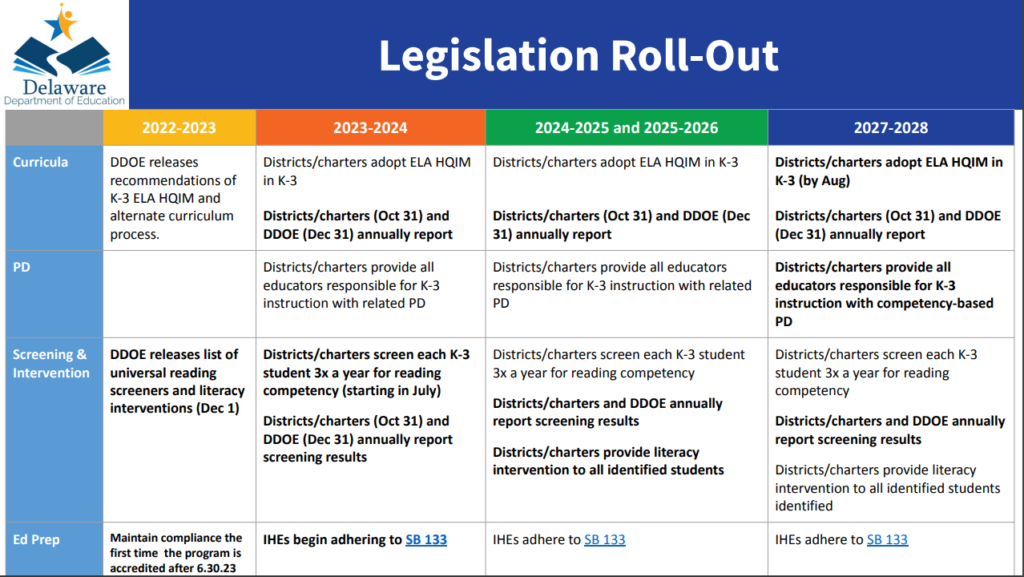Delaware Advances Early Literacy Initiatives
-Delaware continues to focus on early literacy, a critical benchmark for a child’s educational development.
-Three bills passed in the last two legislative sessions are now being implemented, bringing about higher standards for learning materials, training for educators, and screenings for students.
-A few districts in Delaware are being celebrated nationally for their approach to high-quality instructional materials (HQIM).

We often hear that children learn to read and then they read to learn—with this transition happening at a critical point in third grade. And we know that we as a state can do more to enable children to read to learn and reach their full potential.
In recent years, the issue has gotten even more attention for a few reasons. A greater spotlight has shone on this issue as national data have been released about the loss of learning during the pandemic. The science of reading has become accepted as a body of research educators can rely on to teach children to read—and has been upheld in legislative efforts to establish state policies related to teaching reading. Early literacy has also been a high priority of Governor John Carney and the Department of Education.
State Efforts Recognized Nationally
We’ve written in the past about the energy around literacy in Delaware: The state plan was released in 2019, and the Department of Education has led tremendous efforts to strengthen grade level instruction, through high-quality instructional materials and high-quality professional learning to educators. The work has included professional learning grants to support district and charter adoption of these curricula and evidence-based options for educators to get trained in a variety of formats. These formats include traditional in-person trainings and higher education programs, including LETRS (Language Essentials for Teachers of Reading and Spelling) and other nationally recognized programs. Delaware also has been a leader on an innovative approach: microcredentials, which allow educators to demonstrate their knowledge and skills to earn recognition in literacy. This approach—called competency-based professional development—is something the Rodel Teacher Network has advocated for since 2016.
Recently, Delaware has recognized by national experts for this approach. A new report from the Center for Public Research and Leadership at Columbia University, “Staying the Course,” celebrates Delaware’s adoption of high-quality instructional materials (HQIM) and recognizes districts like Seaford, which has transformed from one of the state’s lowest-performing districts to one of its highest on the state’s reading test, after adopting and implementing a high-quality curriculum.
Across the state, districts adopting HQIM have seen increased scores and fewer reductions since the pandemic. Some of the main benefits of this approach, according to educators featured on a recent webinar, are:
- Equity and consistency: Students benefit from tier 1 instruction across the school and district, and educators can support each other.
- Support for teachers: HQIM provide more support for teachers for intervention and removes the burden of educators to create and find materials, which can often lead to significant time demands without improved quality—another area the Rodel Teacher Network has promoted.
- Engaging content: Educators report serving as facilitators of student led conversations and discussions, and that they have found joy in classrooms through using these materials.
- More effective: Educators spoke to reductions in remediation and anticipate significant reduction in the need for intervention if all students receive this high quality instruction.
The state and districts leveraged federal funding in recent years to invest in high-dosage tutoring and focused on accelerated learning in their resources through extended school year grants for summer and after school. Colonial’s partnership with Reading Assist was featured by NBC news as a strong use of these dollars. This partnership coupled with Colonial’s new investment in early literacy HQIM stands to increase outcomes for the district’s early learners.
Implementation of Legislation Underway Bolsters Efforts
In 2021 and 2022, three bills were passed to establish policy requirements related to teacher education, curriculum and training, and screening and reporting. The requirements are now being implemented, including: working with institutes of higher education to ensure faculty who teach prospective teachers are trained on the science of reading, and releasing a list of curriculum and screeners from which districts and charters can select (anticipated in May 2023). These HQIM that focus on literacy (English Language Arts or ELA) in grades K-3 will provide the tier 1 instruction that research tells us can help 95 percent children learn to read without interventions by the end of first grade.
By 2027, all public schools in Delaware are required to be implementing HQIM, training for educators, and screenings to identify those children that do need intervention. By the end of this year, we’ll have a sense of how many districts are already on track and how many students are receiving interventions—based on reporting anticipated by December 31.

Emily Hanford’s “Sold a Story” podcast gives context on why the research on how students learn to read has not been adopted in the last few decades. Her research features Delaware among 26 states that have passed legislation since 2019 intended to support the implementation of the science of reading, and we are one of 12 states that require districts and charters to select from a list of state-approved curricula.
In Action
We know these approaches work—and we have exemplars in our state that are already underway. Reading Assist has demonstrated the benefits of explicit instruction based on the science of reading through targeted intervention—demonstrating the majority of students receiving tutoring reaching benchmarks and growing at twice the anticipated rate. Governor Carney recognized Reading Assist at a recent Rotary Club of Wilmington meeting and noted state efforts to expand their services statewide.
This week, I had the opportunity to visit Cooke Elementary with Senator Laura Sturgeon and see in action the implementation of explicit, systematic instruction based on the science of reading. Red Clay School District is piloting two curricula in anticipation of adoption in the coming years. The excitement of the educators and engagement of the students was exciting to see—and the early results are promising.
Delaware is on the right course – we are optimistic that as more educators are given the training and opportunities, we all will see the benefits.
Related Topics: Delaware education, Delaware legislature, early learning, early literacy, literacy, science of reading, teachers